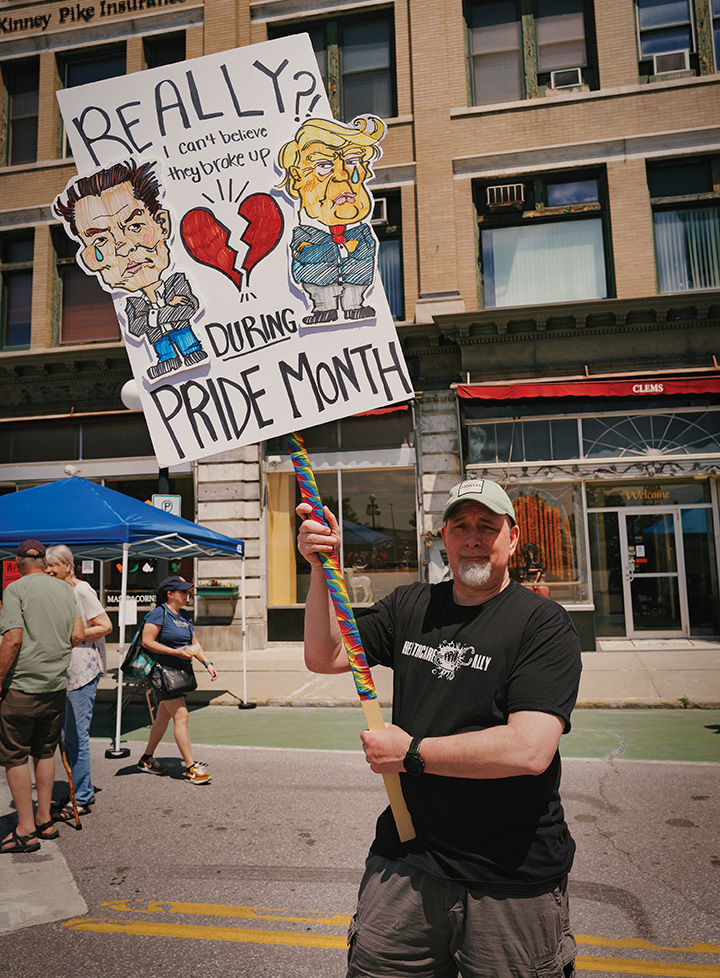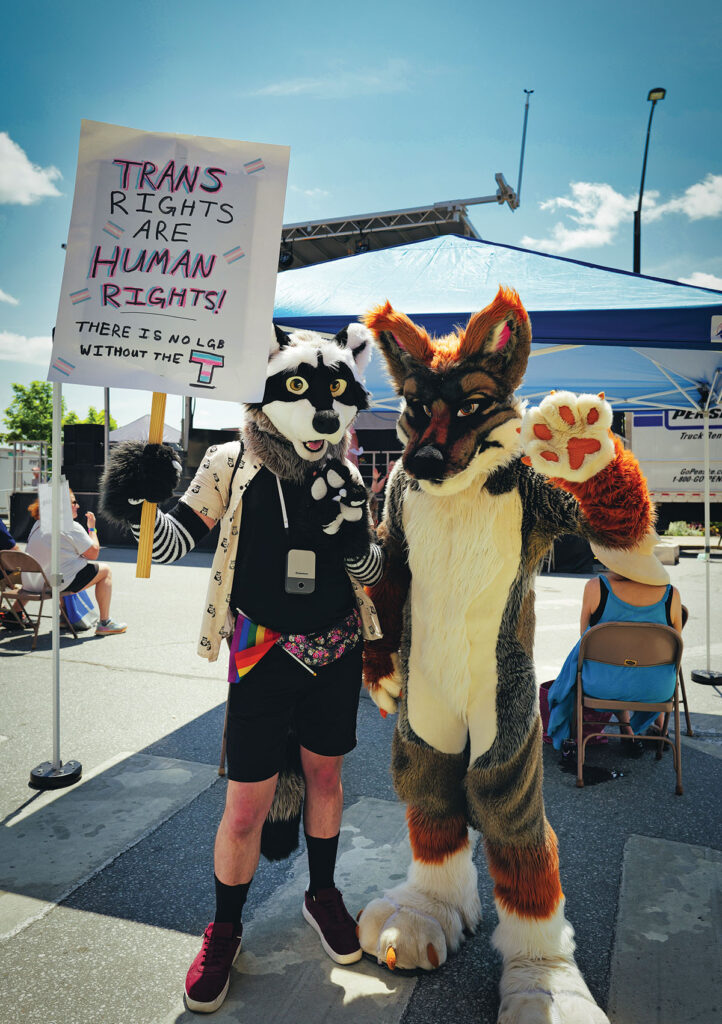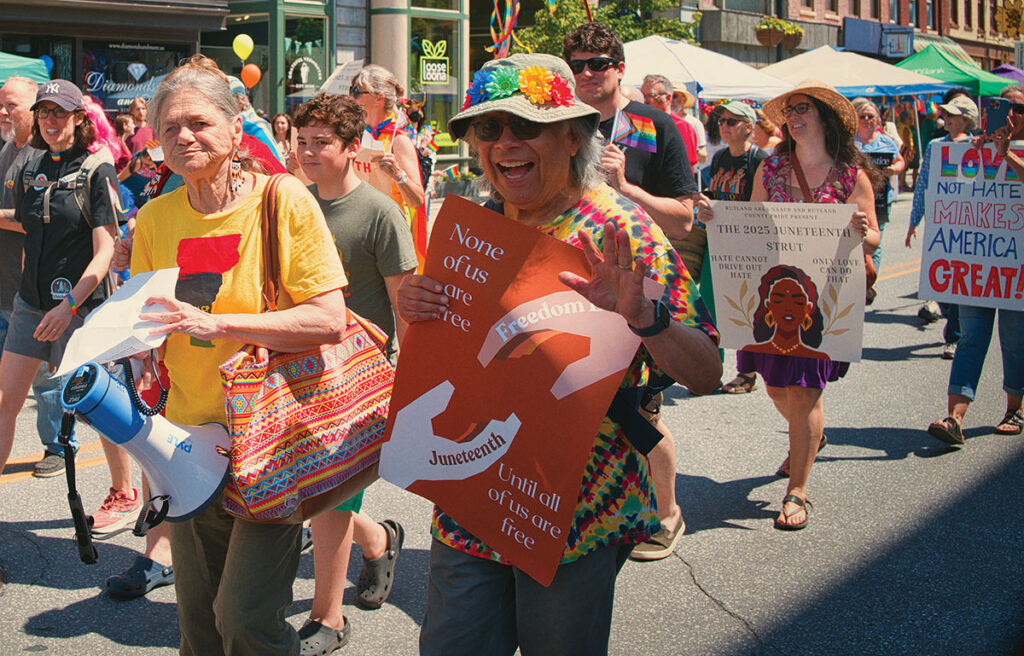By Emily Pratt Slatin
Pride returned to downtown Rutland this June with more color, noise, and purpose than ever before. What began as a joyful celebration quickly became something deeper—something that felt like resistance. And belonging. And a promise that no one in this community has to stand alone.
The day kicked off with the Juneteenth Strut, led by the Rutland Area NAACP, marching from the Rutland Free Library down Center Street. Shortly after, the Pride parade followed, folding into the flow. The two processions moved as one—flag bearers, families, teens, elders, allies, and activists—all marching to the beat of their own truths.
It looked like a river of color—people in motion, flags unfurling in every hue imaginable, each banner a visible declaration of identity, hope, and endurance.
Jeanette Langston stood near the edge of Center Street, watching it all unfold. The flags behind her lifted and snapped in the breeze as if daring someone to look away.
“What a powerful shared moment of resistance,” Langston said, her voice even, her eyes full. “It’s about showing up for each other—especially the ones still learning how.”
She wasn’t wrong.
This year’s event—organized by Rutland County Pride with support from the local NAACP and dozens of community groups—was the largest and loudest yet. Vendors lined the street with local goods and handmade art. A stage hosted drag performers, speakers, and live music. Food trucks stayed busy. Kids painted signs and decorated pronoun buttons. Adults stood back, smiled, and let it all sink in.
What was once a small gathering has become a cornerstone of Rutland’s summer calendar. And this year, it didn’t just feel bigger—it felt bolder. William Fourney-Mills, executive director of Rutland County Pride, promised it would be “bigger than the last.” He was right. But size wasn’t the only thing that mattered. What stood out was the spirit. There was no corporate gloss. No tokenism. Just real people standing in real sun, being real with one another. That kind of authenticity is harder to find than we like to admit.
And right now, it matters more than ever.
Even in Vermont, where we like to think we’re ahead of the curve, queer and trans people still face very real threats—subtle, systemic, and sometimes direct. It’s easy to pretend otherwise in polite company, but those who live it know. Pride doesn’t fix it. It doesn’t erase it. What it does is offer visibility. It plants a flag in the ground—sometimes literally—and says: We’re here. We matter. We’re not going anywhere.
That was the message on Center Street.
There was a sign near the sidewalk that read, “You Belong Here.” It wasn’t loud, but it didn’t need to be. It just needed to exist. Because in a town like Rutland—where smallness can sometimes feel like invisibility—Pride is about more than celebration. It’s about survival. It’s about telling someone, even just one person, that they aren’t alone. There’s a difference between inclusion and belonging. One checks a box. The other holds the door open and says, “Come in. Stay as long as you want.” What happened in Rutland felt like the latter.
It was a day of dancing, drag, sunburns, and sparkle. But underneath all that, it was something else entirely. It was endurance. It was history. It was a group of people saying, with their presence alone, that joy can be a form of protest and community can be a form of safety.
The collaboration with the Rutland NAACP wasn’t just symbolic—it was essential. Queer liberation and racial justice aren’t separate movements. They overlap. They always have. And when those two communities share space, something shifts. Something becomes possible.
By mid-afternoon, the air smelled like fried dough and sunscreen. There were more flags than you could count. People hugged. Some cried. Others stood in quiet relief, just watching. One homemade sign read, “Love Wins Because We Show Up.”
That’s what stuck. Because that’s what this was, in the end. Not just a celebration but a showing up. For ourselves. For each other. For those still finding their words, their names, and their people.
Langston had it right. Showing up is the gift. Everything else—confetti, drag queens, dance tracks—those are mere ribbons. What matters is that we were there. What matters is that we’ll continue to be there. And what matters most is that on one afternoon in June, in the middle of a small Vermont city, nobody had to pretend to be anything other than exactly who they were.
Emily Pratt Slatin (she/her) is a writer and photographer living with her wife on a retired dairy farm in Middletown Springs. Her work can be found at RescueGirl557.com.



By Emily Pratt Slatin
Above left: A man displayed a sign indicating that even Pride month can’t keep all relationships together. Above Center:Two furry Pride attendees displayed their support for trans rights. Above right: People marched down Center St. in Rutland to show their support for Juneteenth and the LGBTQ+ community.




